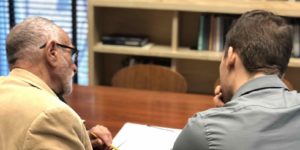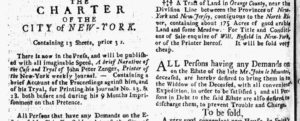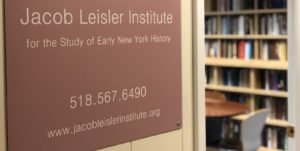The Jacob Leisler Institute for the Study of Early New York History is a unique research and study center focusing on the dynamic but under-examined British colonial period in New York and New Jersey.
Between 1664 and 1773, the former Dutch colony of New Netherland’s diverse population fused under the British into a vibrant cosmopolitan society with ties throughout the Atlantic World. The Institute is named for Jacob Leisler (1640-1691), a prominent New York City merchant, who in the wake of Britain’s 1688 Glorious Revolution emerged as the leader of a rebellion in New York against King James II’s government. Leisler’s tumultuous 1689−1691 New York administration shaped the region’s political, economic, and cultural life up to the outbreak of hostilities with Great Britain in the 1760s. In addition, rapid change transformed the Hudson River and Mohawk valleys, Long Island, and New Jersey: French, German, and British immigrants, enslaved Africans, and others enriched the culture; population expansion created new tensions and mythologies; and the European Enlightenment and contrasting religious movements remade ideologies. On the eve of the American Revolution a dynamic new society had emerged that continues to resonate in the twenty-first century.
As a repository of late seventeenth- and early eighteenth-century New York and New Jersey materials, the Jacob Leisler Institute’s Collections address a wide range of disciplines: history, geography, archeology, ethnohistory, economics, political science, demography, art history, and others. The Institute’s Library and Archives contain extensive genealogical records, original manuscripts, rare books, prints, and maps, microfilms, scholarly journals and monographs, and photographic and digital materials that cover the full extent of the colonial mid-Atlantic cultural area. As new materials come to light, the Institute pursues their acquisition through the generosity of interested donors.
The Jacob Leisler Institute is an independent nonprofit organization. We encourage the public to use the Institute as an educational and research center and scholars to prepare papers, book-length manuscripts, and lectures from our holdings. Through our internship program students learn the skills necessary to preserve and interpret the period’s manuscript and material resources as well as to prepare them for careers in related fields. And through our lecture series, publications, and media, we introduce the latest scholarly research to the public.



